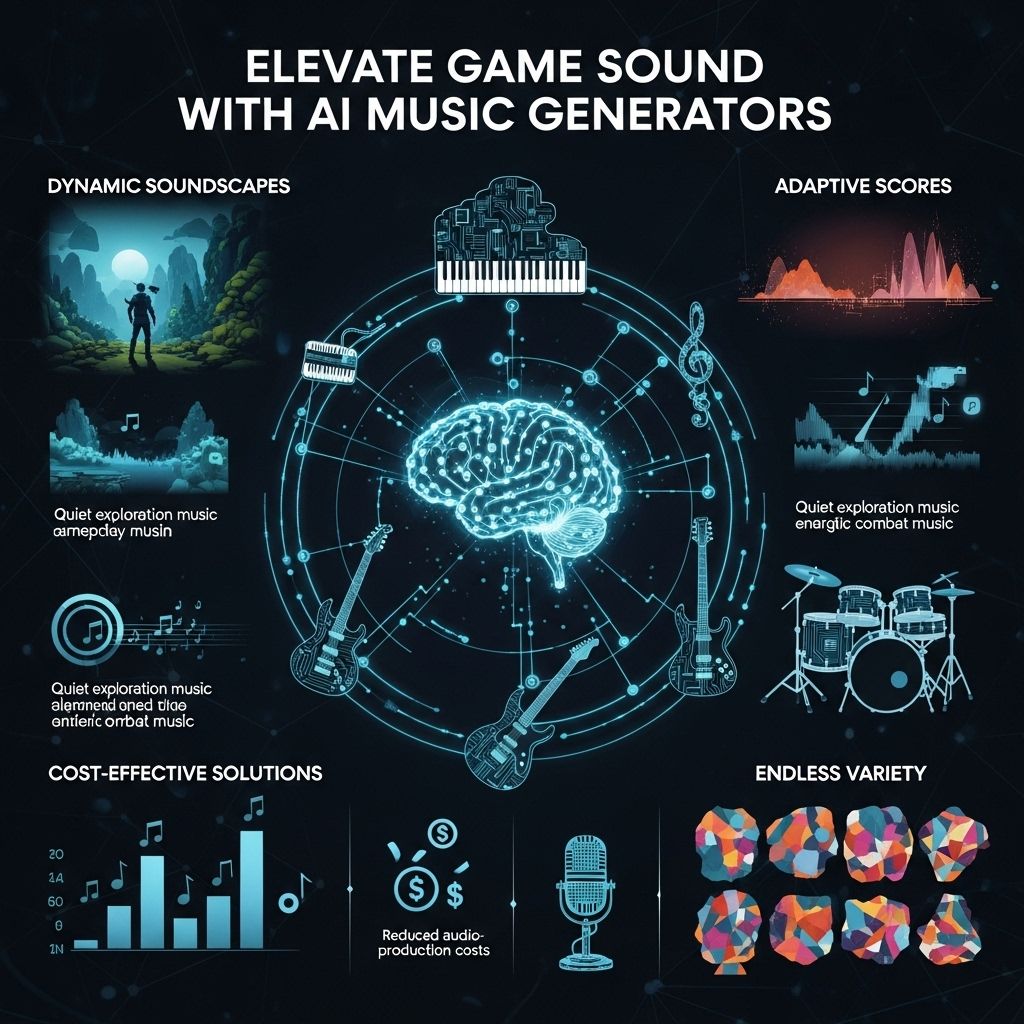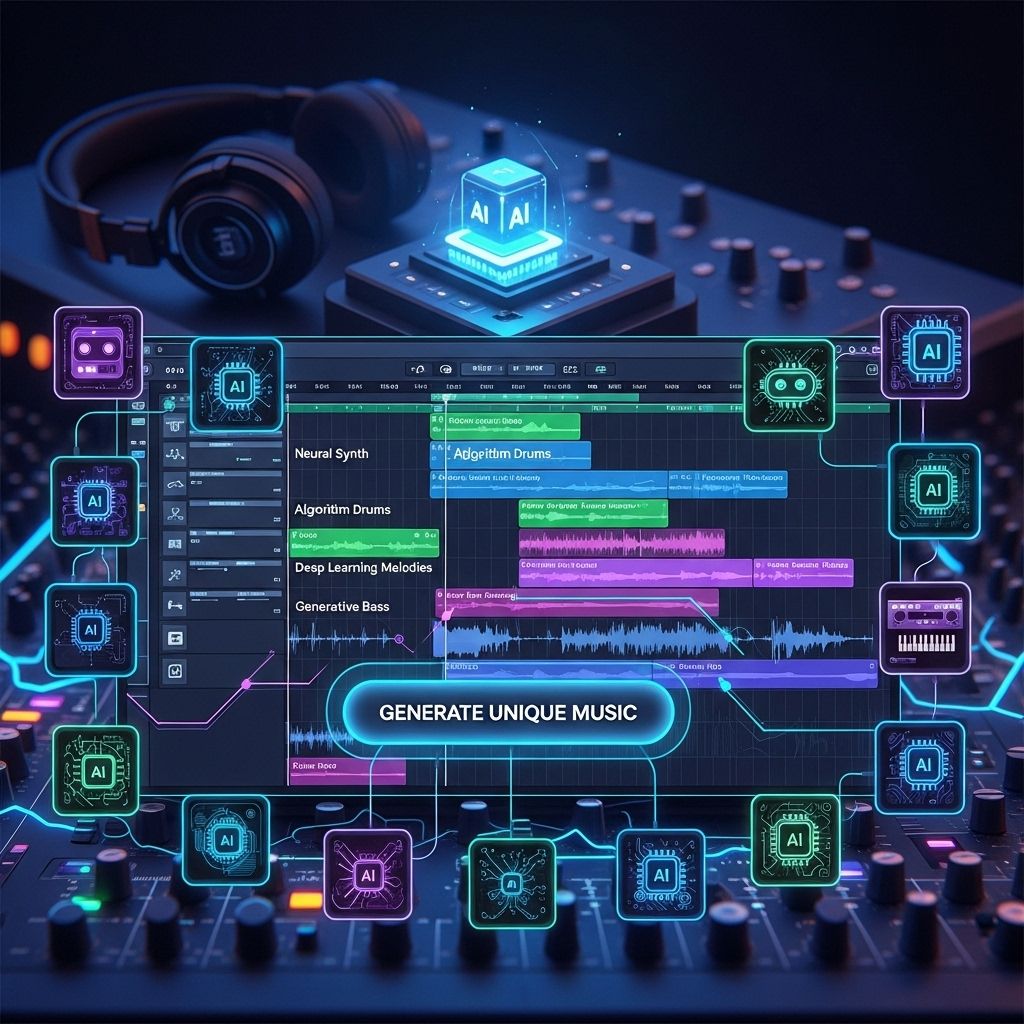Elevate Your Game Sound with AI Music Generators
Discover how AI music generators can enhance your game's audio experience, creating immersive soundscapes and unique soundtracks effortlessly.

In the ever-evolving landscape of video game development, sound design is one of the key elements that enhances the player’s experience. With the advent of artificial intelligence, music generation has taken a giant leap forward, allowing developers to create immersive soundscapes that adapt dynamically to gameplay. This article delves into how AI music generators are transforming the gaming industry, the technology behind them, and their practical applications.
Table of Contents
The Rise of AI in Music Generation
The incorporation of AI into music production is not a novel concept, yet its application in the gaming industry is relatively recent. AI-driven music generators utilize algorithms and machine learning to analyze existing music and create new compositions that fit specific contexts.
How AI Music Generators Work
At the core of AI music generation are neural networks, which are trained on vast datasets of music. Here’s a simplified overview of the process:
- Data Collection: A large dataset of musical compositions across various genres is gathered.
- Training: The neural network is trained to understand patterns, structures, and nuances in the music.
- Generation: Based on the learned patterns, the AI generates new music tailored to specific styles, moods, or themes.
Some notable AI music generators include OpenAI’s MuseNet, Amper Music, and Jukedeck, each offering unique features and capabilities.
Benefits of AI-Generated Music in Gaming
Integrating AI-generated music into games presents numerous advantages:
- Dynamic Adaptation: Music can change in real-time based on player actions, enhancing emotional engagement and immersion.
- Cost Efficiency: Reduces the need for hiring composers for every musical piece, allowing indie developers to allocate resources elsewhere.
- Endless Variety: AI can generate countless variations of music, ensuring that players encounter unique soundtracks in each game session.
Enhancing Player Experience
When soundtracks adapt to gameplay, they become an integral part of the game itself. For example:
| Game Context | Music Adaptation |
|---|---|
| Calm Exploration | Soft, melodic compositions that evoke a sense of wonder. |
| Intense Combat | Fast-paced, adrenaline-pumping tracks that heighten tension. |
| Puzzle Solving | Subtle, ambient sounds that encourage focus and creativity. |
Popular AI Music Generators in the Gaming Industry
Several platforms have emerged as frontrunners in AI music generation, each catering to different needs and offering unique functionalities:
1. AIVA
AIVA (Artificial Intelligence Virtual Artist) is designed specifically for composing music for video games. Its ability to emulate various styles makes it a favorite among developers.
2. Jukedeck
This platform allows developers to create customized soundtracks based on mood, tempo, and genre selection, making it easy to find the right sound for any game.
3. Amper Music
Amper Music is user-friendly, providing tools for developers to generate, edit, and refine music without requiring extensive musical knowledge.
Case Studies: Successful Implementations
Several games have successfully integrated AI-generated music, showcasing its potential:
1. “The Infinite Drum Machine”
This experimental project by Google used AI to create a unique percussive soundtrack that adapts to user interactions.
2. “Procedural Music Generation in No Man’s Sky”
The developers of this game utilized AI to create a soundtrack that evolves as players explore different planets, providing a unique experience tailored to exploration.
3. “Cyberpunk 2077”
While primarily featuring a traditional score, the dynamic nature of the game’s AI allows for real-time adaptations of the score based on player choices and actions.
Challenges and Considerations
Despite its advantages, using AI-generated music comes with its own set of challenges:
- Creativity Limits: While AI can generate music, it often lacks the emotional depth and creativity of a human composer.
- Overfitting: If not properly trained, AI may produce repetitive or uninspired compositions.
- Quality Control: Developers must ensure that the generated music aligns with their vision and quality standards.
Future of AI in Game Sound Design
The future of AI in music generation for games is promising. As technology advances, we can expect:
- Improved Algorithms: Enhanced learning models leading to more sophisticated and emotionally resonant compositions.
- Personalized Experiences: AI could tailor soundtracks to individual player preferences, creating a unique experience for every user.
- Seamless Integration: AI could work in tandem with traditional composers, combining the emotional depth of human creativity with the efficiency of AI.
Conclusion
AI music generators are revolutionizing sound design in the gaming industry, offering innovative solutions to enhance player engagement and experience. As developers continue to explore the potential of AI in music creation, the future promises an even richer auditory landscape for gamers around the world. Embracing these technologies while addressing their challenges will be key to unlocking new possibilities in game soundscapes.
FAQ
What are AI music generators and how do they enhance game sound?
AI music generators are software tools that use artificial intelligence to create original music tracks. They enhance game sound by providing unique, adaptive soundscapes that can change based on the player’s actions or game progression.
Can AI music generators create soundtracks for different game genres?
Yes, AI music generators can create soundtracks tailored to various game genres, including RPGs, action games, and puzzle games, ensuring that the music complements the gameplay and enhances the overall experience.
How can I implement AI-generated music in my game?
To implement AI-generated music in your game, you can use APIs or software tools that offer music generation capabilities, allowing you to integrate the tracks seamlessly into your game engine.
Are AI-generated music tracks copyright-free?
Many AI music generators provide copyright-free music, but it’s essential to check the licensing terms of the specific tool you are using to ensure compliance and proper usage.
What are the benefits of using AI music generators over traditional composers?
AI music generators offer benefits such as lower costs, faster production times, and the ability to generate a vast array of unique tracks, making them a versatile option for indie developers and larger studios alike.
Can AI music adapt to player actions in real-time?
Yes, some advanced AI music generators can create dynamic soundtracks that adapt to player actions in real-time, enhancing immersion and providing a more engaging gaming experience.

